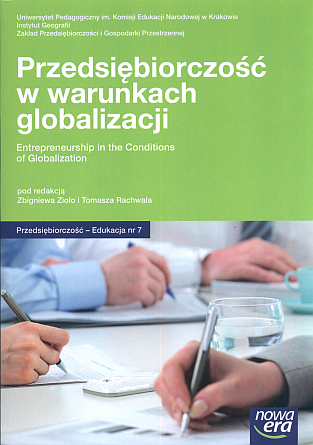Region-wise Distribution of Candidates for the Faculty of Tourism and Recreation at the Pedagogical University of Cracow
DOI:
https://doi.org/10.24917/20833296.7.28Keywords:
rekrutacja, studia z turystyki i rekreacji, UPAbstract
2010 was the second year of recruitment for Tourism and Recreation studies at the Pedagogical University in Krakow. In 2009 as many as 1022 candidates applied for the full-time first stage studies at this faculty. In 2010 the number decreased by 26% (789 candidates). Despite this decrease the faculty was still one of the most popular at the Pedagogical University, and in the ranking of the number of candidates took the second place. Candidates for Tourism and Recreation faculty in 65% originated from the Malopolskie voivodeship, including 22.3% of candidates from Krakow. As compared to the previous year, the share of candidates from the capital of Malopolskie voivodeship decreased by a few per cent. A significant number of candidates originated from the surrounding voivodeships: the Silesian, Subcarpathian and Świętokrzyskie voivodeships. From amongst other voivodeships a significant number of candidates originated from the Lubelskie voivodeship. In the recruitment so far there were no candidates from Kuyavia and Pomerania voivodeship. Most candidates from the Malopolskie voivodeship came from the nearest - Wielicki and Krakovian - poviats, whereas the fewest from the frontier regions (Nowotarski, Miechowski, Oswiecimski and Chrzanowski poviats). Most candidates were town inhabitants - over 69% of the total candidates. There were as many as 24 towns with 5 candidates and more. The secondary school final examinations [Matura] results were also assessed. The best results were achieved by candidates from Tarnow, Kielce, Olkusz and Zakopane. The poorest results were achieved by candidates from Wieliczka, Busko Zdroj and Jordanow. A two-year cycle of research devoted to the candidates for tourism and recreation faculty reveals a considerable shift in the region-wise distribution of candidates for the faculty, however the period is too short to distinguish clear directions and trends in the shift.
References
Długosz Z., 1977, Rekrutacja i wyniki egzaminów wstępnych na kierunek „geografia” Uniwersytetu Jagiellońskiego w niektórych aspektach społeczno-przestrzennych, „Zeszyty Naukowe UJ. Prace Geograficzne”, z. 44, 41–54.
Długosz Z., 1987, Rekrutacja i wyniki egzaminów wstępnych na kierunek geograficzny w Uniwersytecie Jagiellońskim w latach 1968–1985, „Zeszyty Naukowe UJ. Prace Geograficzne”, z. 70, 167–181.
Długosz Z., Biały S., 2011, Studia w zakresie turystyki na tle szkolnictwa wyższego w kraju, Konferencja „Przedsiębiorczość w warunkach globalizacji” UP Kraków, październik 2010 (w druku).
Jakóbczyk-Gryszkiewicz J., Włodarczyk B., 1995, Charakterystyka kandydatów na studia z geografii turyzmu i hotelarstwa w Uniwersytecie Łódzkim w roku akademickim 1994/95, „Turyzm”, t. 5, z. 1, 84–88.
Jażdżewska I., Wolaniuk A., 1996, Charakterystyka kandydatów na specjalność geografia turyzmu i hotelarstwa Uniwersytetu Łódzkiego w roku 1995, „Turyzm”, t. 6, z. 2, 121–126.
Malarz R., Rettinger R., Warcholik W., 2009, Preferencje młodzieży wiejskiej w wyborze kierunku studiów (na przykładzie Uniwersytetu Pedagogicznego w Krakowie), Wydawnictwo WSEiP, Kielce (w druku).
Malarz R., 2009, Charakterystyka kandydatów na studia z turystyki i rekreacji w Uniwersytecie Pedagogicznym w Krakowie (oddane do druku).
Prestiż, profesjonalizm, nowoczesność, 2009, folder reklamowy Uniwersytetu Pedagogicznego w Krakowie, Wyd. Naukowe. UP w Krakowie.
Rocznik statystyczny województwa małopolskiego 2009, Urząd Statystyczny w Krakowie, Kraków.
Szkolnictwo wyższe w Krakowie – perspektywy rozwoju w kontekście zmian demograficznych. Prognoza na lata 2009–2014, K. Jakubik (red.), Urząd Statystyczny w Krakowie, Kraków, listopad 2009.
Szulc T., 2000, Wyjść z wiejskiego kręgu niemocy, „Głos Uczelni”, nr 84, Wyd. Uniwersytetu Przyrodniczego we Wrocławiu, s. 16–24.
Szymańczak J., 1998, Zmiany demograficzne, „Studia Demograficzne”, nr 4/134, s. 8–14.
Downloads
Published
How to Cite
Issue
Section
License
Articles are published under the terms of the Creative Commons License (CC BY-ND 4.0; Attribution– NoDerivs).

